findaccommodation.org
Utilising human-review and AI, the most deep-diving website review service for accommodation-related businesses
★ Get your own unique FAQ + Selling Points on your profile page
★ be seen by 1000s of daily visitors and win new business
findaccommodation.org Ephemeral Miniblog
Layered Realities: The Apartment and Its Ghost
 The JPEG sang a different song. In chrome-bright pixels, the apartment gleamed—bleached wood floors, glass sun slicing through gauze curtains, a soft blur of green from potted life in the corner. The ad copy whispered algorithms of curated desire. You scrolled past it twice before taking the risk.
The JPEG sang a different song. In chrome-bright pixels, the apartment gleamed—bleached wood floors, glass sun slicing through gauze curtains, a soft blur of green from potted life in the corner. The ad copy whispered algorithms of curated desire. You scrolled past it twice before taking the risk.Reality clicked open on a rusted lock. The hardwood had the sheen of spilled cheap varnish. That tangle of cables in the corner? Not artfully staged tech, just a nest of old extenders and coaxial ghosts. The light was never golden—more like the flicker of a dying fluorescent tube in a gas station bathroom.
Photos were lies, sharpened and saturated in some digital backroom, wrapped in filters engineered to mimic the warm nostalgia of a life you never quite had. But being there, boots on crumbling linoleum, you felt the gap—the delta between simulation and skin. Between a file and a floor.
It wasn’t just bait-and-switch. It was a post-truth habitat.
Loading...
Arrival: A Crime Against Enthusiasm
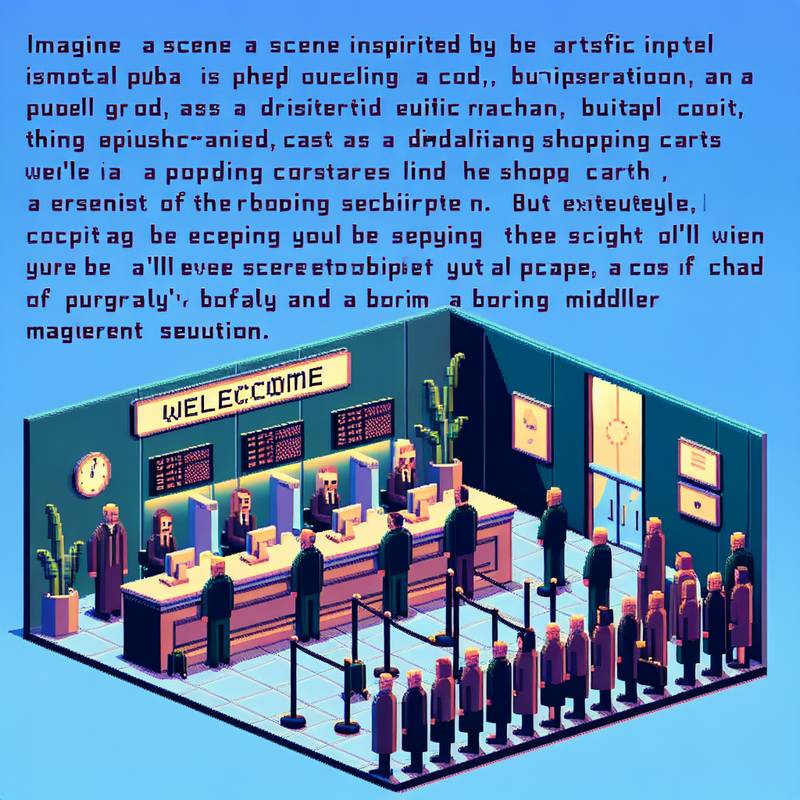 A welcome desk that operated with all the urgency of a melting glacier set the tone nicely—if you define 'nicely' as 'despair wearing a name badge. You walk in hoping for a warm reception and get all the emotional engagement of an airport vending machine. How hard is it to greet someone without looking like you’ve just watched your own dog reverse over your Nan?
A welcome desk that operated with all the urgency of a melting glacier set the tone nicely—if you define 'nicely' as 'despair wearing a name badge. You walk in hoping for a warm reception and get all the emotional engagement of an airport vending machine. How hard is it to greet someone without looking like you’ve just watched your own dog reverse over your Nan?The queue moved with the elegance of a drunk pushing a shopping trolley uphill, and the receptionist seemed to be on a personal mission to win the gold medal in passive aggression. Is this some kind of hospitality industry hazing ritual? Do they train by watching old footage of Stalin’s border crossings?
Still, once you accept that the staff are less “hosts” and more “disinterested witnesses to your slow breakdown”, you settle in. And if first impressions matter, then this one told me I was about to spend three nights somewhere between purgatory and a middle-management seminar on resilience.
Loading...
Block Out or Burn Out
 If you’re staring at a dozen browser tabs, each featuring pristine white bedding and the promise of ‘urban chic’, allow me to save you from decision paralysis: prioritise a hotel with blackout curtains. Not views of the cathedral. Not artisanal soap. Curtains. The kind that turn day into an unconvincing version of 10pm and let you pretend the world doesn’t exist, at least until checkout.
If you’re staring at a dozen browser tabs, each featuring pristine white bedding and the promise of ‘urban chic’, allow me to save you from decision paralysis: prioritise a hotel with blackout curtains. Not views of the cathedral. Not artisanal soap. Curtains. The kind that turn day into an unconvincing version of 10pm and let you pretend the world doesn’t exist, at least until checkout.It’s not glamour—it’s sanity. Because that glorious breakfast buffet is no use if you've spent half the night being woken by the sunrise like a confused crow. Whether you're jet-lagged, hungover, or just trying not to disintegrate on a business trip, quality sleep is your only real luxury.
No rooftop bar can fix a night of staring at a glowing gap between curtain and window frame, wondering if this is how it ends: defeated by interior design. So yes, read the reviews, sniff around the mini-bar options, but if you see 'blackout curtains that’s your gold standard.
Book the darkness. The rest will follow.
Loading...
Accessibility Check: The Hidden Test of Hospitality
 The essence of hospitality is not merely comfort, but universality of access. A stay may boast polished fixtures and sleek automation, yet falter if its design forgets the wheelchair user or the guest with low vision. Ramps too steep, elevators too narrow, or visual cues alone for navigation—these are not minor oversights, but barriers.
The essence of hospitality is not merely comfort, but universality of access. A stay may boast polished fixtures and sleek automation, yet falter if its design forgets the wheelchair user or the guest with low vision. Ramps too steep, elevators too narrow, or visual cues alone for navigation—these are not minor oversights, but barriers.Consider auditory alerts with no visual counterpart, or showers with no grab bars. For someone with sensory sensitivity, even the hum of a poorly insulated HVAC system can erode rest. Accessibility does not end at entryways—it extends to communication, signage, and service gestures personalized to need.
When assessing a stay, evaluate not only amenities but the assumptions behind them. Were captions available? Could staff communicate effectively with someone using a speech device? True accommodation anticipates difference, not sameness.
In the end, accessibility is a measure not of compliance, but of consideration. A place that works well for everyone reveals more than good design—it reveals insight into the shared, diverse fabric of human experience.
Loading...
Design Details That Matter
 Too many chairs in a room and your guests start thinking they’ve wandered into a waiting area for a dentist who’s running very, very late. Too few, and suddenly sitting on the radiator becomes a social event. Interior design isn’t just about matching colours or deciding whether your cactus should have a name—it’s storytelling with furniture.
Too many chairs in a room and your guests start thinking they’ve wandered into a waiting area for a dentist who’s running very, very late. Too few, and suddenly sitting on the radiator becomes a social event. Interior design isn’t just about matching colours or deciding whether your cactus should have a name—it’s storytelling with furniture.Guests unconsciously pick up on layout. A warm welcome feels different when the sofa doesn’t block the path to the wine. Lighting? Underrated sorcery. Soft, warm glows soothe. Clinical white overheads interrogate. Which is fine if you’re confessing to a lamp.
Textures matter. One plush throw does more for comfort than a dozen ornamental cushions that leap off the sofa every time someone sits down. And pathways—clear ones, without the guest hopping a coffee table like it’s a gym session—are vital.
Design is spatial empathy. It’s saying, “I see you, I want you comfortable, and yes, the loo is on the left.”
That sort of care lingers. Long after the wine’s been finished.
Loading...
Walls, Doors, and Other Measures of Solitude
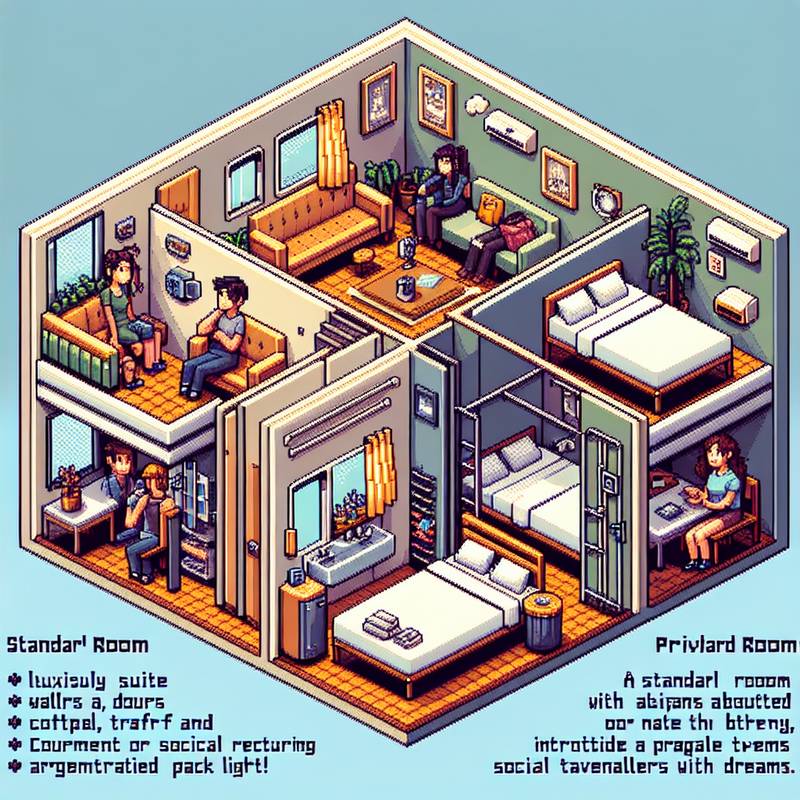 A suite gives you walls, doors, and the soft suggestion of success. Maybe a couch too puffy for real conversation. You sit, you think about your childhood, you take a nap. Ideal for couples clinging to romance like it’s a life preserver or travelers with matching luggage and coordinated Vitamin regimens.
A suite gives you walls, doors, and the soft suggestion of success. Maybe a couch too puffy for real conversation. You sit, you think about your childhood, you take a nap. Ideal for couples clinging to romance like it’s a life preserver or travelers with matching luggage and coordinated Vitamin regimens. The standard room is competent, modest, a beige handshake. Perfect for the pragmatic traveler—the kind who unpacks only if staying three nights or more. There’s a hairdryer bolted to the wall like a decision you’ll one day regret.
Hostel dorms are for the brave or broke—people with dreams and digital itineraries. Someone coughs in the bunk above you; someone below mutters in Portuguese. Shared bathrooms, shared dreams, fleeting friendships made over toast.
Private hostel rooms are for introverts pretending to be extroverts. You tell yourself you’re enveloped in culture while clutching your earbuds like talismans.
Each room type a personality test you didn’t mean to take.
Loading...
The Lens of Expectations
 Online real estate listings are exercises in selective perception. Photographs frame reality with both precision and deception, emphasizing light and spaciousness while suppressing flaws with angles and filters. A property’s digital twin becomes a Platonic ideal—smooth, clean, and eternally bathed in golden hour sunlight.
Online real estate listings are exercises in selective perception. Photographs frame reality with both precision and deception, emphasizing light and spaciousness while suppressing flaws with angles and filters. A property’s digital twin becomes a Platonic ideal—smooth, clean, and eternally bathed in golden hour sunlight.Then comes the confrontation with the physical analog. The “cozy sunroom” is, in fact, a narrow alcove with one dusty window. The “modern kitchen” feels dated under fluorescent lights. Odd smells, traffic noise, and the peculiar slope of the floor reveal dimensions unrenderable by pixels.
This contrast is not solely the fault of mischievous landlords; it’s baked into our psychology. Humans unconsciously extrapolate perfection from partial information. Pixelated promises ignite our imagination, which fills the unseen void with optimism.
Thus, disappointment is not just a measure of deceit but of misplaced expectation. The photograph is not the property. It is merely a fragment, curated and compressed, interpreted through the lens of desire. Reality, by contrast, is wonderfully obstinate.
Loading...
The Bowtie and the Croissant
 The front desk clerk wore a bowtie like it was a statement piece, which, based on the rhinestones, it probably was. I complimented it in passing—because sparkly bowties deserve affirmation—and he responded by upgrading my view and sneaking me a list of “secret” local bakery recommendations. That small exchange spiraled into a morning spent sampling pastries so transcendent they might have been whispered into existence by sugar sprites.
The front desk clerk wore a bowtie like it was a statement piece, which, based on the rhinestones, it probably was. I complimented it in passing—because sparkly bowties deserve affirmation—and he responded by upgrading my view and sneaking me a list of “secret” local bakery recommendations. That small exchange spiraled into a morning spent sampling pastries so transcendent they might have been whispered into existence by sugar sprites.It wasn’t just the unexpected almond croissant nirvana. It was that someone stopped, noticed, and shared a moment of unrehearsed kindness. That bowtie wasn’t just flair; it was the quiet declaration of someone saying, “I’m glad you’re here, and maybe this will help you feel that, too.”
People think hotels are about thread counts and mini soaps shaped like dolphins, but it’s the humans behind the keycards that turn a place into an experience. The ones who make you laugh or feel seen when you’re traveling and tired and maybe unsure where you put your joy.
Turns out, it was behind the croissant.
Loading...
Packing vs. Property
 You ever stay at a place so fancy, you realize your suitcase is just... full of lies? Like, you packed a hair dryer, but the bathroom has a chrome space station on the wall that not only dries your hair—it judges it. Then you open the closet and BAM! Robes that feel like a sheep whispered a lullaby directly onto your skin. So the one you packed? That sad terry cloth bath-shame? Never leaving the suitcase.
You ever stay at a place so fancy, you realize your suitcase is just... full of lies? Like, you packed a hair dryer, but the bathroom has a chrome space station on the wall that not only dries your hair—it judges it. Then you open the closet and BAM! Robes that feel like a sheep whispered a lullaby directly onto your skin. So the one you packed? That sad terry cloth bath-shame? Never leaving the suitcase.But flip it. You're in a no-frills roadside motel where “amenities” mean a Bible and a weird smell. Suddenly, your 12-item self-care arsenal becomes survival gear. You ARE the property.
So packing isn't about what you need, it's about what your accommodation refuses to deal with. Five-star hotel? Bring one outfit and your sense of entitlement. Budget inn? Bring a toolkit, water purification tablets, and a priest.
It’s not packing. It’s reconnaissance. You don’t prepare for a trip—you negotiate with potential failure.
Loading...
The Devil in the Booking Details
 When seeking refuge from the tedium of one’s own drawing room, many embark on the noble quest of reserving accommodation. Yet in their desperation to flee the familiar, they frequently fall prey to an error so ordinary and so avoidable, it ought to be embroidered upon every travel pillow: failing to read the fine print.
When seeking refuge from the tedium of one’s own drawing room, many embark on the noble quest of reserving accommodation. Yet in their desperation to flee the familiar, they frequently fall prey to an error so ordinary and so avoidable, it ought to be embroidered upon every travel pillow: failing to read the fine print.It is astonishing how swiftly people click “Book Now,” entranced by filtered photographs and suspiciously effusive reviews, without the faintest glance at cancellation policies or additional fees. One might book a lavish suite only to discover, upon arrival, that breakfast is as absent as virtue in high society, or that check-in times are calculated for bats rather than civilised beings.
To avoid such bourgeois dismay, read not with the eyes of a dreamer, but with the cold gaze of a solicitor. In life, as in lodgings, it is the small print that reveals the true character beneath the expensive drapery.
Loading...
Taps, and the Hidden Depths of Polish
 The only thing shinier than the chrome tap in the lavatory was the existential awareness that someone had not only cleaned beneath it, but also behind it. Behind it. This, dear reader, is not a place frequented by even the most ambitious of domestic optimists. Behind the tap lies a realm of ancestral soap scum, the sediment of a thousand handwashings, and vague evolutionary experiments involving mildew.
The only thing shinier than the chrome tap in the lavatory was the existential awareness that someone had not only cleaned beneath it, but also behind it. Behind it. This, dear reader, is not a place frequented by even the most ambitious of domestic optimists. Behind the tap lies a realm of ancestral soap scum, the sediment of a thousand handwashings, and vague evolutionary experiments involving mildew. So when I saw that even this forgotten crevice gleamed with the sterile smugness of a freshly disinfected operating theatre, I knew the truth: this hotel room wasn’t just clean—it had been judged clean by the sort of being who flips mattresses for sport and alphabetises the data packets in the Wi-Fi.
It’s not the polished floor, the vacuum lines, or even the strategically folded toilet paper that reveals a place’s true hygiene credentials. It’s this: the clandestine cleanliness of a tap’s undercarriage. That’s where cleanliness lives when it knows it’ll be unobserved—unless observed by someone who knows.
Loading...
The Measure of Welcome
 A guesthouse proves its character not in the flourish of the welcome mat, but in the quiet details that accommodate those often overlooked. A ramp unnoticed by many becomes a gateway for one; a shower seat or tactile signage may spell the difference between independence and limitation. Accessibility is not a flourish—it is hospitality in its purest sense.
A guesthouse proves its character not in the flourish of the welcome mat, but in the quiet details that accommodate those often overlooked. A ramp unnoticed by many becomes a gateway for one; a shower seat or tactile signage may spell the difference between independence and limitation. Accessibility is not a flourish—it is hospitality in its purest sense.Too often, a stay forgets that inclusion is not an embellishment but a foundation. A stunning view means little if the lift is broken. Luxury evaporates when a guest must navigate stairs on crutches or search in vain for audible fire alarms.
When a place attends to the specific needs of the blind, the deaf, the immobile—not as an afterthought, but as a deliberate act—it transcends mere commerce. It honours the image of humanity in all its diverse expressions. The best accommodations are not simply places where all may stay, but where all may belong.
Loading...
Noise Level Reality
 What you hear when you close your eyes is, in the end, the true character of a place. The dribble of water in the pipes overhead—a spectral plumbing ballet announcing every neighbor’s ablution. The sibilant screech of tyres masticating the rain-slicked tarmac outside at 3am. The rhythmic bass reverberations of some distant, moronic revel—proof, if ever it was needed, that joy, when shared from below through floorboards, becomes oppression.
What you hear when you close your eyes is, in the end, the true character of a place. The dribble of water in the pipes overhead—a spectral plumbing ballet announcing every neighbor’s ablution. The sibilant screech of tyres masticating the rain-slicked tarmac outside at 3am. The rhythmic bass reverberations of some distant, moronic revel—proof, if ever it was needed, that joy, when shared from below through floorboards, becomes oppression.What does one do, then, when checking in online before booking? One can’t deploy ears in cyberspace. But what we have is forensic review-reading—decode the buried complaints: “lively area” becomes club adjacent, “characterful walls” often mean thin as rice paper. Search terms like “quiet,” “sleep,” and “street noise” in the reviews section become tools of guerrilla reconnaissance.
Then, and only then, can you expect to hear your own thoughts once you're there. And sleep, that fragile indulgence, might not be stolen by somebody else's Thursday night triumph—or their plumbing.
Loading...
Packing vs. Property: A Holiday Identity Crisis
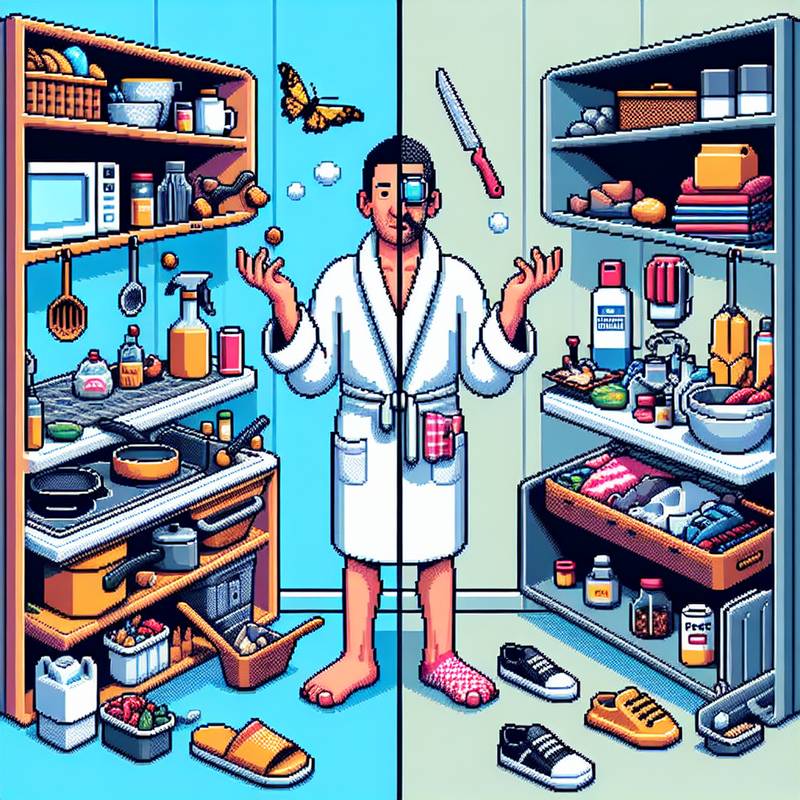 Self-Catering and the Saucepans of Doom
Self-Catering and the Saucepans of Doom Go self-catering and suddenly you're auditioning for MasterChef, but with a tea towel for a cape and a frying pan that wobbles. You feel compelled to pack half a spice rack and the potato peeler your aunt swore was “life-changing.” And why? Because the listing said “fully equipped kitchen” and you believed it, like a fool who once trusted a man who said he could recite all the counties of England in reverse alphabetical order.
Stay in a hotel, and it’s slippers, robe, and a mini shampoo that smells like citrus-based betrayal. You can leave the hairdryer, thank heaven. But then you pack “smart casual” in five variations, because you might descend to dinner via grand staircase, not the fire escape.
It’s the accommodation that dictates whether you're packing bath bombs or bin bags. And the real question isn’t what to pack, but who you become: holidaymaker or honorary janitor with a temporary postcode.
Loading...
The Resolution of Illusion
 The photo shimmered with a preternatural glow, like a dream beamed into my neural feed. Clean walls, minimalist furniture, a horizon of calm. I clicked 'Book Now' with a confidence I’d come to distrust.
The photo shimmered with a preternatural glow, like a dream beamed into my neural feed. Clean walls, minimalist furniture, a horizon of calm. I clicked 'Book Now' with a confidence I’d come to distrust.On arrival, the reality was stale paint and a mysterious hum emanating from the floorboards. The window view was truncated by the bloated carcass of a neighboring structure, its shingles flaking like ancient skin. I stood there, suitcase in one hand, sense of self in the other, trying to reconcile a digital fiction with the sensorial truth. Was it deception? Or did the photo simply capture a parallel moment—one where the light hit just right, where entropy had paused its march?
Maybe the lie wasn’t in the pixels, but in my willingness to believe them. These days, reality feels like a degraded copy of someone else’s vision. The question isn't whether we’re being misled—it’s whether we want to be. The image always arrives first. The truth stumbles in later, out of focus.
Loading...
How to Sweet Talk Your Way Into a Better Hotel Room
 You want a better hotel room without spending more money? Here’s the move: show up late. I’m talkin’ after 6 p.m., closer to 8 if you can. Why? Because by then, the hotel staff knows what rooms are really left, and if that suite with the ocean view didn’t get booked, they’re way more likely to slide you that upgrade—for free.
You want a better hotel room without spending more money? Here’s the move: show up late. I’m talkin’ after 6 p.m., closer to 8 if you can. Why? Because by then, the hotel staff knows what rooms are really left, and if that suite with the ocean view didn’t get booked, they’re way more likely to slide you that upgrade—for free.Be cool, though. This ain’t the time for demands. You want to finesse it like you’re asking Grandma for a second slice of pie. “Any chance there’s something with a view?”—simple, polite, and makes it sound like you’re not expecting it, but you’d truly appreciate it. Hotels love gratitude almost as much as they love not having empty premium rooms.
Also, if you’re celebrating something—birthday, anniversary, finally paying off student loans—mention it. Front desk folks are human. If they vibe with your story, you just might end up getting champagne and a room with a balcony. Or at least extra pillows.
Loading...
How to Not Get Trapped in a Murder Mystery Inn
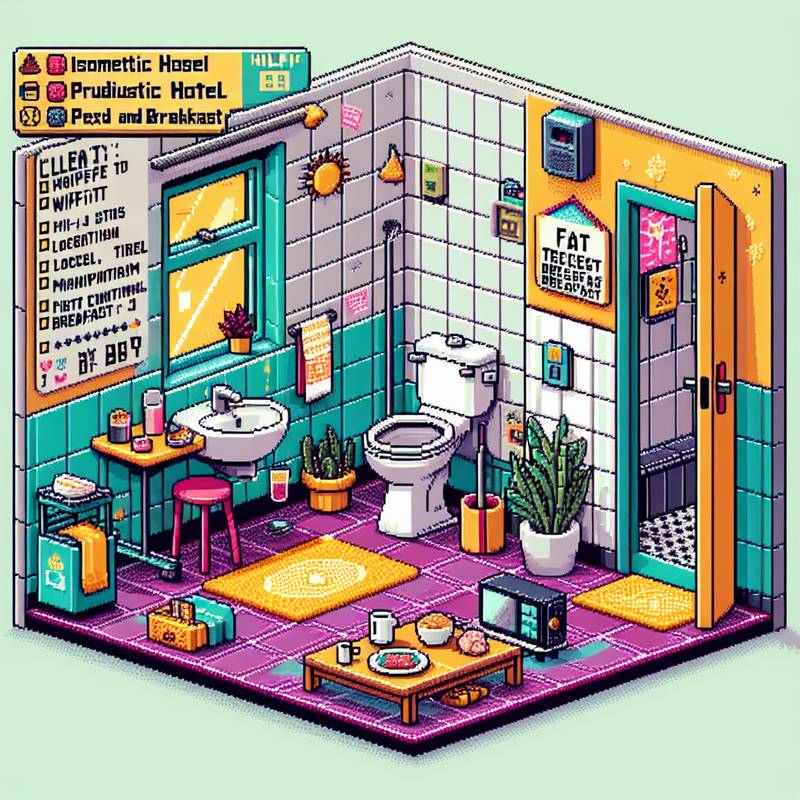 If the place describes itself as “quirky,” just know that’s code for “there’s definitely a toilet in the kitchen.” When picking a place to stay—hostel, hotel, or charming B&B that’s really just someone’s house with extra toast—you need three things: cleanliness, location, and doors that lock like they mean it.
If the place describes itself as “quirky,” just know that’s code for “there’s definitely a toilet in the kitchen.” When picking a place to stay—hostel, hotel, or charming B&B that’s really just someone’s house with extra toast—you need three things: cleanliness, location, and doors that lock like they mean it.Cleanliness: You don’t want to wonder if the stains are decorative. Location: Because there’s a difference between “walking distance” and “if you start now, you’ll miss tomorrow.” And the lock thing—listen, if your door secures with a hook and a prayer, that’s not ambiance. That’s a legal gray area.
Also: Wi-Fi. If it promises “limited coverage,” that means you’ll be watching YouTube in four-second bursts like it’s 2004. And “continental breakfast” better not just be a sad bowl of dry cereal next to a toaster that doesn’t work. You’re not asking for a butler. You just want to sleep somewhere that doesn’t feel like a dare.
Loading...
The Bellman’s Nod
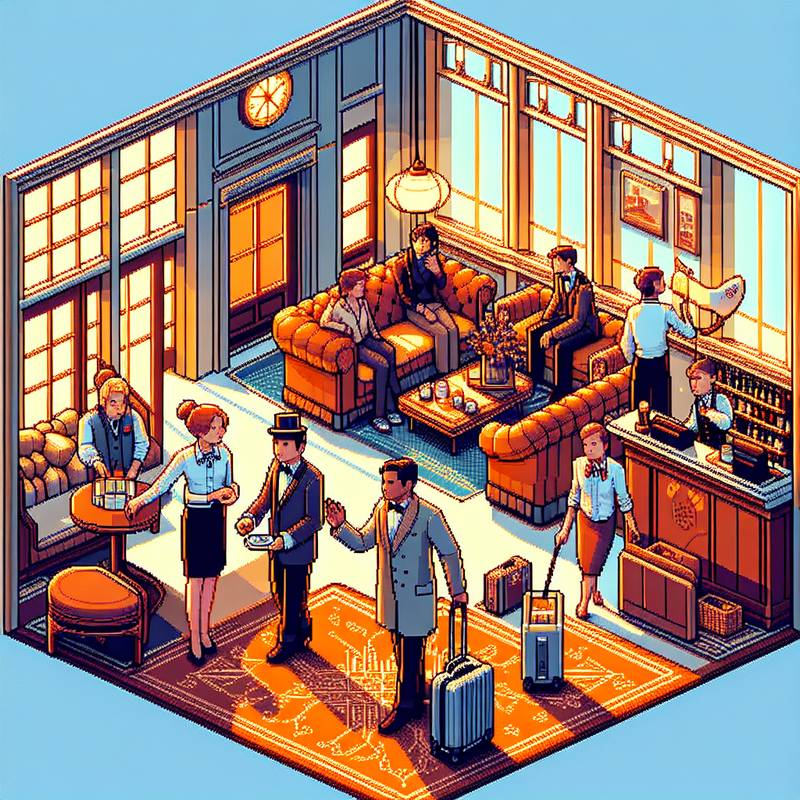 It was the bellman, of all people—the quiet gravity in his nod, the practiced ease with which he lifted the handle of my battered suitcase and called it 'vintage,' not worn. He didn't linger, didn't hover for gratuity or praise, just offered a knowing smile like he saw through to the story beneath the scuffs. That small remark, tossed like a pebble across the murky pond of my travel fatigue, reframed everything.
It was the bellman, of all people—the quiet gravity in his nod, the practiced ease with which he lifted the handle of my battered suitcase and called it 'vintage,' not worn. He didn't linger, didn't hover for gratuity or praise, just offered a knowing smile like he saw through to the story beneath the scuffs. That small remark, tossed like a pebble across the murky pond of my travel fatigue, reframed everything.Suddenly, the lobby's warmth felt intentional, as if curated for returning souls rather than passing guests. The coffee in the lounge wasn’t just hot; it was restorative. Every interaction afterward—concierge, housekeeping, even the bartender with a tattoo of a compass behind her ear—felt like pieces of a quiet conspiracy to make me feel known, not merely served.
The bellman's comment became the lens through which the stay was filtered—more than hospitality, it was the quicksilver gift of recognition, the rare grace of being seen without explanation.
Loading...
Clinical Efficiency with a Side of Existential Numbing
 The check-in process was smoother than a dolphin in a wetsuit. You walk in expecting to be interrogated like you're carrying plutonium in your socks, but instead you’re greeted by someone so calm you wonder if they’ve been sedated or just accepted the futility of existence. Within minutes, you're keycarded, slightly startled that a system involving technology, human interaction and your damp travel-addled brain managed to function flawlessly.
The check-in process was smoother than a dolphin in a wetsuit. You walk in expecting to be interrogated like you're carrying plutonium in your socks, but instead you’re greeted by someone so calm you wonder if they’ve been sedated or just accepted the futility of existence. Within minutes, you're keycarded, slightly startled that a system involving technology, human interaction and your damp travel-addled brain managed to function flawlessly.The lobby was engineered for tranquility—ambient lighting, soft tones, and the sort of abstract art that lets you project just enough meaning to avoid confronting your own emptiness. Staff smiled like they’d had joy forcibly installed at a training seminar, and the scent in the air was some bastard offspring of eucalyptus and smugness.
It quietly set the tone: you’ve arrived somewhere that’s pretending everything’s okay. And for a few moments, you believe them. That’s what a good check-in does—not just get you a room, but let you forget how the world is held together with duct tape and denial.
Loading...
Noise Level Reality
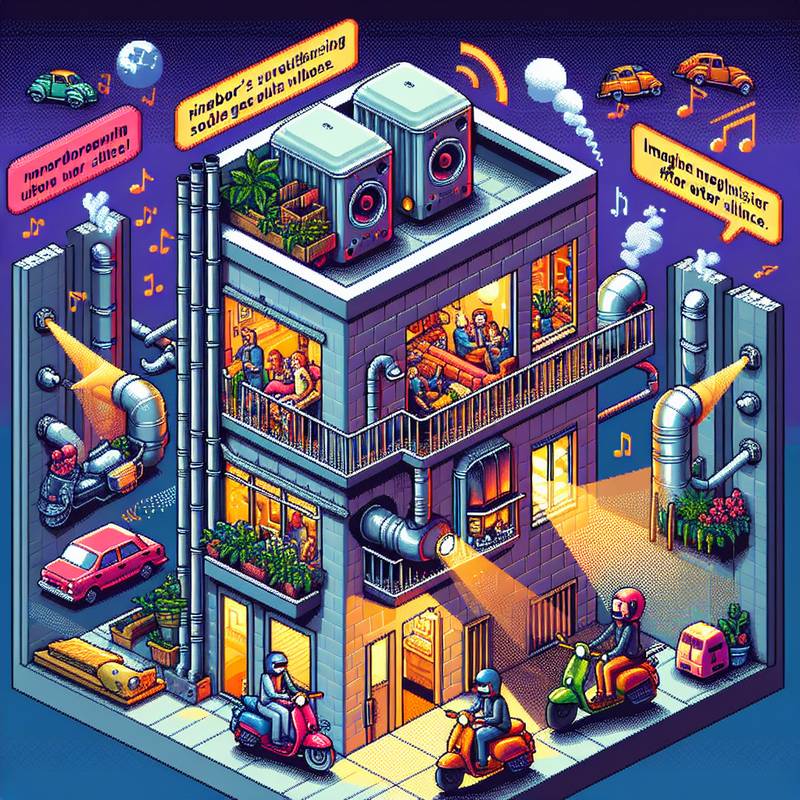 Sound, like wallpaper, you don’t notice it until you do—until it starts peeling at the edges, curling into your consciousness. The would-be charm of vintage pipes, for instance, morphs at 2:14 a.m. into an indignant banshee each time someone upstairs flushes. Meanwhile, urban murmurs, half-drowned in architectural denial, surge through the windows: scooters whining like wasps; lovers arguing with operatic sincerity. Then, of course, the sacred ritual of your neighbour's subwoofer—its pagan thump-thump drilling through the drywall like a toothache.
Sound, like wallpaper, you don’t notice it until you do—until it starts peeling at the edges, curling into your consciousness. The would-be charm of vintage pipes, for instance, morphs at 2:14 a.m. into an indignant banshee each time someone upstairs flushes. Meanwhile, urban murmurs, half-drowned in architectural denial, surge through the windows: scooters whining like wasps; lovers arguing with operatic sincerity. Then, of course, the sacred ritual of your neighbour's subwoofer—its pagan thump-thump drilling through the drywall like a toothache.People romanticise cities, claim they pulse with life. But what they often mean is: they’re loud. And walls lie. Photos lie. Listings lie. So, listen before you listen. Read reviews with a forensic ear. Search for “quiet,” “noise,” “thin walls.” Message the host, not for compliments about the view, but about the decibel count after 10 p.m.
Because silence—true, unbroken, hermetic silence—isn’t the norm. It’s the amenity you didn’t know you were booking.
Loading...
The Sass Behind the Service
 The concierge saw me dragging my suitcase like it had just filed for divorce—wheels wobbling, dignity gone—and offered to carry it upstairs himself. I joked, “Careful, she bites.” Without missing a beat, he said, “So do I,” and winked. That was it. One weirdly perfect exchange. But suddenly, this wasn’t just a hotel, it was a personality. A place with a pulse.
The concierge saw me dragging my suitcase like it had just filed for divorce—wheels wobbling, dignity gone—and offered to carry it upstairs himself. I joked, “Careful, she bites.” Without missing a beat, he said, “So do I,” and winked. That was it. One weirdly perfect exchange. But suddenly, this wasn’t just a hotel, it was a personality. A place with a pulse. That thirty-second moment cracked open the shell of transactional hospitality and let some actual human in. The kind where you're not just room 407, you're the person with the emotionally unstable luggage. From there, every staff interaction came with a little extra spark—like they’d all RSVP’d to be in on the joke.
It changed how I remember the stay. Not the spotless room or overpriced mini-bar cashews, but that moment someone met me not just with service, but with style. And maybe a little sass. And it turns out, that kind of connection? Way more refreshing than the complimentary cucumber water in the lobby.
Loading...
The Sanctity of Silence
 If you're teetering on the edge of a holiday decision breakdown—browsing twelve tabs of identical-looking “boutique” hotels all claiming to redefine comfort with artfully-placed succulents—then allow me to reduce your anguish. Prioritise soundproofing. Yes, it's not as photogenic as an infinity pool or artisanal soap, but it is far more valuable when Room 302 decides that now is the ideal time to experiment with clog dancing.
If you're teetering on the edge of a holiday decision breakdown—browsing twelve tabs of identical-looking “boutique” hotels all claiming to redefine comfort with artfully-placed succulents—then allow me to reduce your anguish. Prioritise soundproofing. Yes, it's not as photogenic as an infinity pool or artisanal soap, but it is far more valuable when Room 302 decides that now is the ideal time to experiment with clog dancing.The ability to control your auditory environment is a vastly underrated joy. It’s the difference between serene rest and learning far too much about your neighbour’s call-centre job in Milwaukee. Good acoustic insulation is civilisation's quiet promise that your sleep won't be pierced by lift bings, plumbing gurgles, or the 3 a.m. return of Drunken Barry and the Shout Choir.
You're not booking a sleep-deprivation experiment. You’re booking peace. Ensure your room guards it like a paranoid squirrel tasked with protecting a particularly valuable acorn. That acorn is your sanity. Choose wisely.
Loading...
The Claire Effect
I walked into the lobby like a raccoon sneaking into a luxury kitchen—curious, slightly disheveled, and not expecting anyone to treat me like royalty. But there she was: the front desk attendant, Claire, with a smile as real as the 4 a.m. bags under my eyes. Instead of just handing over the room key like a magician doing a bad card trick, she asked how my trip was going. I said, “Honestly? I’ve been in three airports and one emotional breakdown.” She laughed—not politely, but like she genuinely got it.That 20 seconds of being seen, not processed? It lingered. Suddenly the coffee tasted better, the lobby music annoyed me less. Even the towels felt fluffier—like they’d just been hugged by someone with good intentions. It’s wild how a small, honest connection can reset your entire mood. It's not about service; it’s about people who remember they’re people, too.
Loading...
The Power of a Well-Timed Upgrade
 You know what takes a hotel from “meh” to “I’m going to miss this robe like it’s my childhood dog”? It’s not the pillow menu or the spa that costs more than your car insurance—it’s that one employee who actually sees you. I checked in with travel-hair and fried nerves, and the woman at the front desk didn’t just give me my key—she gave me humanity. She clocked the exhaustion in my eyeballs and said, “We upgraded you to a corner room with a view. You look like you could use some space to breathe.”
You know what takes a hotel from “meh” to “I’m going to miss this robe like it’s my childhood dog”? It’s not the pillow menu or the spa that costs more than your car insurance—it’s that one employee who actually sees you. I checked in with travel-hair and fried nerves, and the woman at the front desk didn’t just give me my key—she gave me humanity. She clocked the exhaustion in my eyeballs and said, “We upgraded you to a corner room with a view. You look like you could use some space to breathe.”I wanted to cry, but I’d just put on waterproof mascara and I respect the craft. That tiny moment flipped the whole vibe. Suddenly, the hotel wasn’t just a place to sleep—it was a place where someone noticed me, cared, and acted on it. And that? That’s hospitality doing a high-wire act in stilettos. Not flashy, just real.
It’s the little things, baby. That front desk fairy godmother? She made the trip.
Loading...
The Magical Art of the Polite Ask
 If you start your hotel check-in by simply asking 'Is there any chance of a complimentary upgrade today?' you may have just unlocked the Konami Code of travel perks. That one sentence — polite, hopeful, and cynically optimistic — is the verbal equivalent of fishing for an Oreo and accidentally pulling up a whole cheesecake. Hotels often have a few unbooked rooms with better views, quieter corners, or fewer mysterious carpet stains, and front desk staff aren't just keycard dispensers. They’re the keepers of the room allocation Matrix.
If you start your hotel check-in by simply asking 'Is there any chance of a complimentary upgrade today?' you may have just unlocked the Konami Code of travel perks. That one sentence — polite, hopeful, and cynically optimistic — is the verbal equivalent of fishing for an Oreo and accidentally pulling up a whole cheesecake. Hotels often have a few unbooked rooms with better views, quieter corners, or fewer mysterious carpet stains, and front desk staff aren't just keycard dispensers. They’re the keepers of the room allocation Matrix.Here’s the kicker: this works best when you check in slightly later in the day. Early guests just get what’s available. But if you stroll in around 4 p.m., that’s when the puzzle pieces have mostly settled, and the staff know their inventory. Combine that with being kind, making eye contact, and not being the person who loudly complains about the smell of the lobby candles, and boom — potential upgrade achieved, all without spending a dime.
Loading...
Accessibility Check: The Hidden Measure of Hospitality
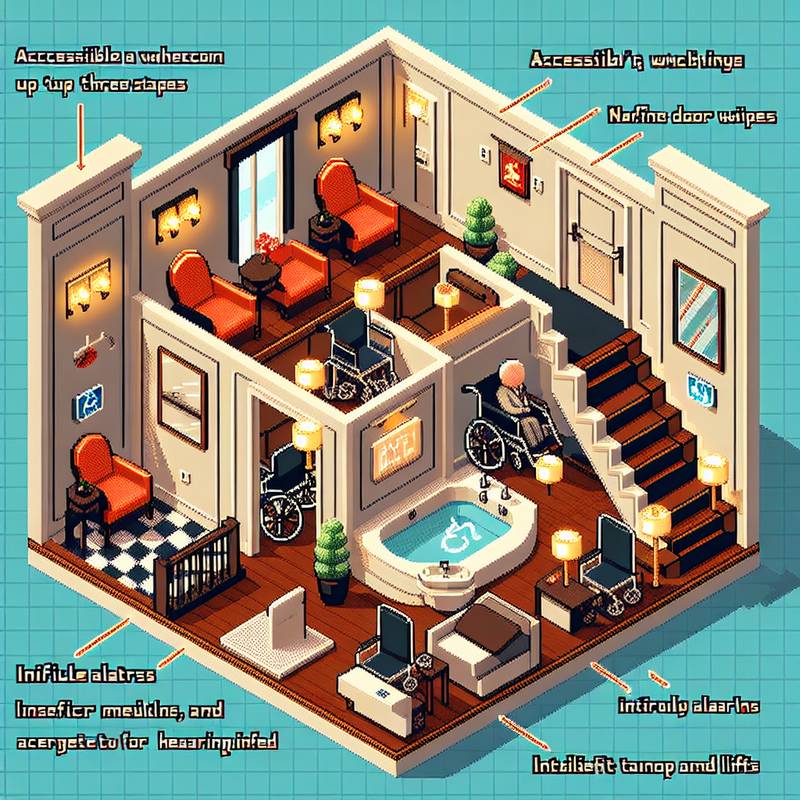 Ever tried navigating a boutique hotel in a wheelchair only to discover that the ‘accessible’ bathroom is perched up three steps? Such ironic misadventures aren’t rare. Accessibility, too often, is a box ticked rather than a thoughtful integration.
Ever tried navigating a boutique hotel in a wheelchair only to discover that the ‘accessible’ bathroom is perched up three steps? Such ironic misadventures aren’t rare. Accessibility, too often, is a box ticked rather than a thoughtful integration.For guests with mobility, sensory, or cognitive needs, the measure of a stay’s success lies in the details: door widths that accommodate rather than challenge; signage that informs without confusion; lighting that considers neurodivergence; lifts that simply work. In one particular instance, a hotel in Prague proudly boasted ‘universal design’—yet the hearing-impaired guest was left baffled by fire alarms without strobes.
It’s not about extravagance, but empathy. Ramps are not decorative. Braille is not optional. Staff training isn’t a 'nice to have'—it's the foundation of dignity for all. The true gold standard isn’t a five-star review from a travel blogger, but a contented nod from someone whose needs were silently anticipated and effortlessly met.
Only then does a stay transcend accommodation to become genuine hospitality.
Loading...
Welcome to the Human Resources Test Lab
 If you ever want to recreate the feeling of being abducted by aliens who’ve recently downsized their spaceship into a Premier Inn foyer, try this check-in experience. You arrive, half-dead from travel, expecting one human interaction, like a welcome or maybe just basic eye contact, and instead you’re greeted by a touchscreen that’s less responsive than your dad after three pints.
If you ever want to recreate the feeling of being abducted by aliens who’ve recently downsized their spaceship into a Premier Inn foyer, try this check-in experience. You arrive, half-dead from travel, expecting one human interaction, like a welcome or maybe just basic eye contact, and instead you’re greeted by a touchscreen that’s less responsive than your dad after three pints.It’s all self-check-in now, which is tech-speak for we fired the receptionist and you’re the mug doing their job. There’s no music, just the hum of fluorescent lighting and a silence so oppressive it could probably be bottled and sold to North Korean interrogation squads. The instructions assume you’re fluent in Kafkaesque bureaucracy and the screen freezes halfway through anyway, just to remind you that you’re a carbon-based meat puppet at the mercy of a mid-range hotel chain.
By the time you get your key card, you’re already emotionally broken. It’s less check-in, more psychological hazing ritual. Welcome to your stay. Now cry into your kettle.
Loading...
Suite Dreams Without Suite Prices
 Want the suite experience on a lobby-level budget? You better master the ancient art of the “Late Arrival Plus Charm” combo. Roll into that hotel around 8 or 9 p.m.—not too late, not too early. By then, a bunch of folks have no-showed or canceled, and those premium rooms are just sitting there, lonely.
Want the suite experience on a lobby-level budget? You better master the ancient art of the “Late Arrival Plus Charm” combo. Roll into that hotel around 8 or 9 p.m.—not too late, not too early. By then, a bunch of folks have no-showed or canceled, and those premium rooms are just sitting there, lonely.Now, here’s the finesse: walk in like you’ve had a long day without complaining about your long day. Friendly tone, maybe drop a subtle, “Been looking forward to this all week.” You’re not begging—you’re bonding. Front desk agents have discretion. You treat them like humans, they just might treat you like royalty. Corner room upgraded with a view? That could be your reward for not being that person yelling about their points status.
And if you’re celebrating anything—even something small—drop it in casual, like, “First kid-free weekend in months.” Boom. Instant upgrade energy.
All that, and your wallet never even flinched.
Loading...
Whispers Between the Walls
If you're only going to pin your hopes on one feature when booking accommodation, pin them to soundproofing. Yes, Wi-Fi is essential, and a rainfall shower's lovely, but none of it matters if you can hear Terry in 2B clearing his throat every seven minutes until 3 a.m. One thin wall away from disaster, your holiday becomes an aural hostage situation. Decent soundproofing means your rest isn’t dependent on the whims of strangers—none of whom seem to close a door without treating it like a medieval battering ram.It’s the hidden luxury, the unsung hero of hotel design: freedom from the stomping, flushing, laughing, arguing, bad-TV-watching chaos of others. Prioritising soundproofing is like opting for a seatbelt—you don’t think about it when everything’s fine, but when trouble hits, you’ll thank every decibel of silence that stood between you and your neighbours.
So next time you're scrolling through boutique options and eyeing the pillow menu, pause and ask: do the walls keep secrets? For your sanity’s sake, they’d better.
Loading...
Walls and Whispers: A Traveler’s Room
 The suite breathes differently. It exhales silence, the hush of thick carpet under bare feet and time stretching in wide, lazy loops. It's for the traveler who courts solitude, who prefers the universe behind a door that bolts with certainty. The standard room, by contrast, is the everyman’s haven—trim, efficient, a good night’s sleep with no pretense. It serves the practical, the passerby, the soul in transit.
The suite breathes differently. It exhales silence, the hush of thick carpet under bare feet and time stretching in wide, lazy loops. It's for the traveler who courts solitude, who prefers the universe behind a door that bolts with certainty. The standard room, by contrast, is the everyman’s haven—trim, efficient, a good night’s sleep with no pretense. It serves the practical, the passerby, the soul in transit.Meanwhile, in hostel dorms, the world is a chorus of zippers and whispered phone calls at midnight. This is where stories collide—rucksack to rucksack, dream to dream. Ideal for pilgrims of the budget path, for those who find comfort in shared humanity. But the private hostel room—ah, a whisper within the clamor. A place for independent spirits craving both the hum of travel and the peace of solitude.
Each room is a compass needle pointing homeward in its own way. What you choose says less about your wallet, more about the moment you're living.
Loading...
findaccommodation.org (c)2009 - 2026